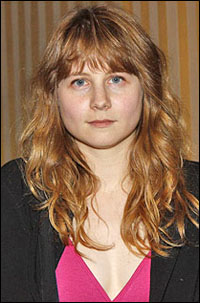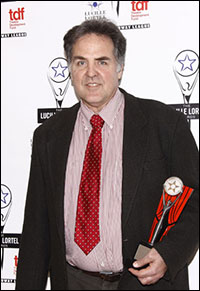
The letter, sent by email on March 23, has been made public by recipients, and has also appeared in published reports. A spokesman for the not-for-profit Off-Broadway company said that the letter was sent to "subscribers who had either already seen the show or who hadn't yet booked tickets," but not to subscribers who have booked future dates.
The letter was prompted by concerns expressed by subscribers, theatregoers and some drama critics that the play was simply too long for its own good. Filled with pauses and wordless actions that convey the humdrum, workaday, numbing business of being stuck in a crappy job and finding no hope or order outside of the workplace, The Flick runs three hours long.
Directed by Sam Gold, the play's pauses and actions and beats are largely all scripted, just as they were IN Baker's Circle Mirror Transformation, which was also directed by Gold, for an extended, acclaimed run at PH in 2009-10.
The play is set in 2012 in a "falling-apart" single-screen movie house called The Flick, in Worcester, MA, just before it's to be converted from film projection to digital technology. The play opens with light from a film projector aimed at the PH crowd (serving as the screen, essentially) as a soundtrack plays, indicating the rolling credits of a movie. The lights come up after several minutes to reveal the auditorium of The Flick. The length of that opening sequence, as well as pauses between scenes, and ritual workplace action (mopping, sweeping, etc.) add up to a feeling of length that might not be evident on the page (the script runs 126 typewritten pages). Two minutes of stage time can feel like an eternity to some, however. But Baker has made it clear here that she finds power in the pauses. And Sanford is standing by his writer. Playwrights Horizons is, after all, a place for writers to do their thing.
The script, made available to press (as scripts usually are), indicates Baker's passion for pauses. Here's the opening stage directions: After the theatre audience has filed in, the house lights slowly dim (onstage in the movie audience and also in the theater audience). Bernard Herrmann's intro sequence to 'The Naked and the Dead' starts playing, and the light from the projector beams out over our heads. Images that we cannot decipher are being projected. Dust motes are illuminated by the light. This lasts 2 minutes (from beginning to end of the song) and all we can see are abstracted dancing images shooting out of the film projector. Then the song ends, and the unknown movie ends, and there is a bright flash of green, and then white, and then the sound of the film reaching the end of its spool in the projector. The movie theatre lights automatically flicker on, and after about 5 seconds…"
Other stage directions throughout the play include: "Avery nods. They go back to sweeping. After about twenty seconds" and "About ten more seconds, then Avery finishes sweeping" and "A happy pause in which they realize they've broken the tension, and then awkward pause following that happy pause" and "A minute later" and "This goes on for about twenty seconds" and "A very long, uncomfortable pause," and on and on.
 |
||
| Annie Baker |
||
| Photo by Joseph Marzullo/WENN |
The Flick continues to April 7 at Playwrights Horizons' Mainstage Theater.
**
Here's the letter sent by Sanford:
The Flick has stirred up so many emotions, both positive and negative, in audiences that I thought I would reach out to all of you and share my thoughts about it. I have to admit I was not totally prepared for it to be such a polarizing show. I love Annie's work and thought this was just the play to introduce her to a wider audience. Here are three characters rarely portrayed on the stage these days and Annie imbues them with such humanity and integrity.
Here is how she describes them in our artist interview:
A female projectionist, on whom the men in the play projected their fears and fantasies...this like "unattainable" girl up there in the shadows who was dying for someone to get to know her "for real"...a 35-year-old Red Sox fan who was worried he'd be working there for life...and young film buff who came from both a different race and class background than the other characters in the play. They all started emerging from the movie theatre set in my mind. Also, the main characters in the play are a black guy, a woman, and a Jew (although I no longer make Sam's Jewishness obvious). And that was important to me when I started writing the play. Three of the great "Others" of American cinema, all of them victim to extreme stereotypes. And yet what are Hollywood movies without blacks, Jews, and women? I wanted these people to be quietly (maybe even unconsciously) fighting against their respective pigeonholes. And I also grew up knowing lower-middle-class Jews, hyper-educated black people, and women who wear baggy clothes and no makeup, and yet it is so rare to encounter any of those people in plays and movies. It feels like those people are like forced to wander outside of and on the periphery of plays and movies. So I literalized that — they're like cleaning up everyone else's crap AFTER the movie is over.
I hoped that Annie's palpable and compassion her characters and the play's fairly straightforward plot about a developing ethical workplace quandary along with would win you all over. Of course I had some trepidation about its length. Theatregoers rarely encounter three-hour plays these days even though most classic scripts from earlier ages routinely clock in well above that length. When performances began and some of you walked out at intermission, emphatically expressing your displeasure to our House Manager, we had lengthy discussions about what to do. Could we make internal cuts within the scenes or could whole scenes go? Were there places to pick up the pace? Each scene seemed to have important reasons for being there. And what about those long silences between lines? Here are Annie's thoughts on this subject:
I'm just trying to accurately portray the people who live in the movie theatre inside my head, and I guess there's a lot of moments of not-talking in that movie theatre inside my head. All the walking and sweeping and mopping and dustpan-banging-there's a whole symphony happening that Sam and the actors orchestrated.. But I wouldn't call that silence. I think there's actually very little ACTUAL silence in this play. But yeah, my favorite moments in all of my plays are usually moments when people aren't talking.
 |
||
| Tim Sanford |
||
| Photo by Joseph Marzullo/WENN |
Did we know we had programmed a three-hour play when we chose it? No. I don't think Sam Gold, the director, did either. But after our initial concern about walkouts, we began to pay attention to the other voices, the voices that urged Annie and Sam not to cut a second, the voices imbued with rapture for a theatre experience unlike any they had experienced and for a production that stayed with them for days even weeks afterwards. And it became clear to me that every moment of the play and production was steeped in purpose. Annie had a vision and this production beautifully executes that vision. And at the end of the day, we are a writer's theatre and my first responsibility is to that writer. My goal is not to dissuade any of you who disliked the play. I would rather evince passionate dislike than a dispassionate shrug.. I imagine that most of you have read the many good reviews about the play and then most recently the fact that the play won the prestigious Susan Smith Blackburn Prize. If you read these stories and continue to say to yourself, "I still don't know what they see in it," I applaud your independence of mind. Hopefully that free-thinking will swing to our favor in your response to other productions of ours.
Our hope is to cultivate an audience that trusts the underlying integrity of our decision-making process. We are the only theatre in New York (and practically the country) devoted solely to the premiere of new American plays and musicals. We use our Subscriber Bulletin to share with you what excites us about an upcoming play and to convey the passion that went into its selection.
The business of putting on new plays is not empirical. We follow some rules and rely on experience, but we're also following our hearts. And we appreciate that you are taking a risk and putting your faith in us when you sign up with us. We are dependent upon your willingness to take that ride with us. We need you.
So thank you for caring enough to complain or to praise. Perhaps we can all agree that whatever values we look for in the theatre, we all stand on the common ground that it is a vital and important art form that we look to illuminate the human experience with complexity and integrity. Warm Regards,
Tim Sanford
Artistic Director


























